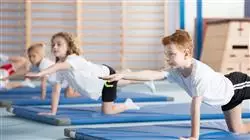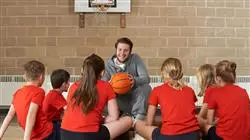University certificate
Scientific endorser

The world's largest faculty of sports science”
Introduction to the Program
Motor action as a tool in the development of emotions in neuroeducational processes. A novel concept of enormous importance for the quality of life of students"

Emotional development in conjunction with cognitive development is gaining ground in the way education is approached. This concept has also been significantly development with the support of neurosciences applied to education. In this new approach, Physical Education acquires a dimension of extraordinary importance, transcending beyond the crucial objectives of developing motor skills into the use of movement as a tool for the development and improvement of cognitive functions. The study of emotions in the educational processes based on motor action becomes essential for the work in this fascinating field of education.
The prestigious professors of this program have drawn on their specialized and advanced knowledge based on experience and rigorous scientific criteria in the development of this highly scientifically and academically rigorous training.
All modules are accompanied by abundant iconography, with photos and videos by the authors, which are intended to illustrate, in a very practical, rigorous and useful way, advanced knowledge in neuroeducation and physical education for physical therapists.
Content chosen to make this course a highly effective learning process"
This Postgraduate diploma in Emotions in Neuroeducational Processes through Motor Action contains the most complete and updated scientific program on the market. The most important features of the program include:
- Case studies presented by experts in Neuroeducation and Physical Education
- The graphic, schematic, and eminently practical contents with which they are created provide scientific and practical information on the disciplines that are essential for professional practice
- It contains practical exercises where the self-evaluation process can be carried out to improve learning
- With special emphasis on innovative methodologies in Neuroeducation and Physical Education
- All this will be complemented by theoretical lessons, questions to the expert, debate forums on controversial topics, and individual reflection assignments
- Content that is accessible from any fixed or portable device with an Internet connection
- Complementary content available in multimedia format
A highly specific online Postgraduate diploma, which will allow you to acquire the necessary tools to work on emotions based on motor action in a short period of time"
The program ncludes in its teaching staff professionals belonging to the field of Neuroeducation and Physical Education, who pour into this training the experience of their work, in addition to recognized specialists belonging to reference societies and prestigious universities.
Thanks to its multimedia content developed with the latest educational technology, it will allow the professional a situated and contextual learning, that is to say, a simulated environment that will provide an immersive learning programmed to train in real situations.
The design of this program is based on Problem-Based Learning, by means of which the educator must try to solve the different professional practice situations that arise throughout the course. For this, the educator will be assisted by an innovative interactive video system, developed by recognized experts in the field of Neuroeducation and Physical Education with extensive teaching experience.
Incorporate a neuroscientific approach to your work in the area of Physical Education to add to your teaching objectives cognitive and emotional development through this new form of educational intervention"

The advances in neuroeducation in the area of Physical Education, from an eminently practical approach that will allow you to give an innovative twist to your professional practice"
Why study at TECH?
TECH is the world’s largest online university. With an impressive catalog of more than 14,000 university programs available in 11 languages, it is positioned as a leader in employability, with a 99% job placement rate. In addition, it relies on an enormous faculty of more than 6,000 professors of the highest international renown.

Study at the world's largest online university and guarantee your professional success. The future starts at TECH”
The world’s best online university according to FORBES
The prestigious Forbes magazine, specialized in business and finance, has highlighted TECH as “the world's best online university” This is what they have recently stated in an article in their digital edition in which they echo the success story of this institution, “thanks to the academic offer it provides, the selection of its teaching staff, and an innovative learning method aimed at educating the professionals of the future”
A revolutionary study method, a cutting-edge faculty and a practical focus: the key to TECH's success.
The most complete study plans on the university scene
TECH offers the most complete study plans on the university scene, with syllabuses that cover fundamental concepts and, at the same time, the main scientific advances in their specific scientific areas. In addition, these programs are continuously being updated to guarantee students the academic vanguard and the most in-demand professional skills. In this way, the university's qualifications provide its graduates with a significant advantage to propel their careers to success.
TECH offers the most comprehensive and intensive study plans on the current university scene.
A world-class teaching staff
TECH's teaching staff is made up of more than 6,000 professors with the highest international recognition. Professors, researchers and top executives of multinational companies, including Isaiah Covington, performance coach of the Boston Celtics; Magda Romanska, principal investigator at Harvard MetaLAB; Ignacio Wistumba, chairman of the department of translational molecular pathology at MD Anderson Cancer Center; and D.W. Pine, creative director of TIME magazine, among others.
Internationally renowned experts, specialized in different branches of Health, Technology, Communication and Business, form part of the TECH faculty.
A unique learning method
TECH is the first university to use Relearning in all its programs. It is the best online learning methodology, accredited with international teaching quality certifications, provided by prestigious educational agencies. In addition, this disruptive educational model is complemented with the “Case Method”, thereby setting up a unique online teaching strategy. Innovative teaching resources are also implemented, including detailed videos, infographics and interactive summaries.
TECH combines Relearning and the Case Method in all its university programs to guarantee excellent theoretical and practical learning, studying whenever and wherever you want.
The world's largest online university
TECH is the world’s largest online university. We are the largest educational institution, with the best and widest online educational catalog, one hundred percent online and covering the vast majority of areas of knowledge. We offer a large selection of our own degrees and accredited online undergraduate and postgraduate degrees. In total, more than 14,000 university degrees, in eleven different languages, make us the largest educational largest in the world.
TECH has the world's most extensive catalog of academic and official programs, available in more than 11 languages.
Google Premier Partner
The American technology giant has awarded TECH the Google Google Premier Partner badge. This award, which is only available to 3% of the world's companies, highlights the efficient, flexible and tailored experience that this university provides to students. The recognition as a Google Premier Partner not only accredits the maximum rigor, performance and investment in TECH's digital infrastructures, but also places this university as one of the world's leading technology companies.
Google has positioned TECH in the top 3% of the world's most important technology companies by awarding it its Google Premier Partner badge.
The official online university of the NBA
TECH is the official online university of the NBA. Thanks to our agreement with the biggest league in basketball, we offer our students exclusive university programs, as well as a wide variety of educational resources focused on the business of the league and other areas of the sports industry. Each program is made up of a uniquely designed syllabus and features exceptional guest hosts: professionals with a distinguished sports background who will offer their expertise on the most relevant topics.
TECH has been selected by the NBA, the world's top basketball league, as its official online university.
The top-rated university by its students
Students have positioned TECH as the world's top-rated university on the main review websites, with a highest rating of 4.9 out of 5, obtained from more than 1,000 reviews. These results consolidate TECH as the benchmark university institution at an international level, reflecting the excellence and positive impact of its educational model.” reflecting the excellence and positive impact of its educational model.”
TECH is the world’s top-rated university by its students.
Leaders in employability
TECH has managed to become the leading university in employability. 99% of its students obtain jobs in the academic field they have studied, within one year of completing any of the university's programs. A similar number achieve immediate career enhancement. All this thanks to a study methodology that bases its effectiveness on the acquisition of practical skills, which are absolutely necessary for professional development.
99% of TECH graduates find a job within a year of completing their studies.
Postgraduate Diploma in Emotions in Neuroeducational Processes through Motor Action
The application of the theoretical and practical approaches of neurosciences in the field of physical education are of great importance to ensure the comprehensive development of children. Therefore, at TECH Global University we have created a program focused on the teaching of this subject as a way to improve athletic and academic performance and, simultaneously, to ensure the emotional well-being of students. Specifically, our curriculum covers the theoretical and practical foundations of the neuroeducational discipline, the chemical structure that determines the brain reward system, the pedagogical models of instruction and evaluation (Models of Sports Education MED and Personal and Social Responsibility, Comprehensive Model of Sports Initiation TGfU, Ludotechnical and Adventure Education, among others) and the methodologies that allow the construction of such didactic spaces. At the end of the proposed course, it is expected that professionals make the most of the expressive resources of the body, incorporating them in plans that have a wide diversity of movement stimuli and spatial-temporal constraints.
Postgraduate Diploma in Neuroeducational Processes, Emotions and Motor Action
With this TECH Postgraduate Diploma it is possible to enrich daily teaching practice, since the necessary tools are provided for the promotion of sport-expressive activity, through the planning and execution of didactic strategies that potentiate motor, cognitive and socioemotional skills. Thanks to the mastery of knowledge regarding the impact of psychological processes in the brain articulations that make understanding and communication possible, teachers will be able to detect the main problems that hinder such understanding in order to solve them through the use of different mechanisms to activate attention, memory, emotion, motivation and creativity. Likewise, future graduates will design physical adaptation programs, where activities that strengthen individuality and cooperation will be prioritized and the contributions of this brain science that address the relationship between emotions and motor action will be integrated. All this will guarantee not only their insertion in the labor market, but also their excellent performance in promoting integral development based on exercise, good habits and mental health.







